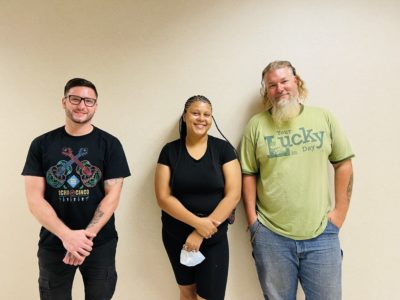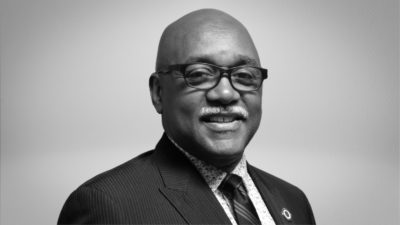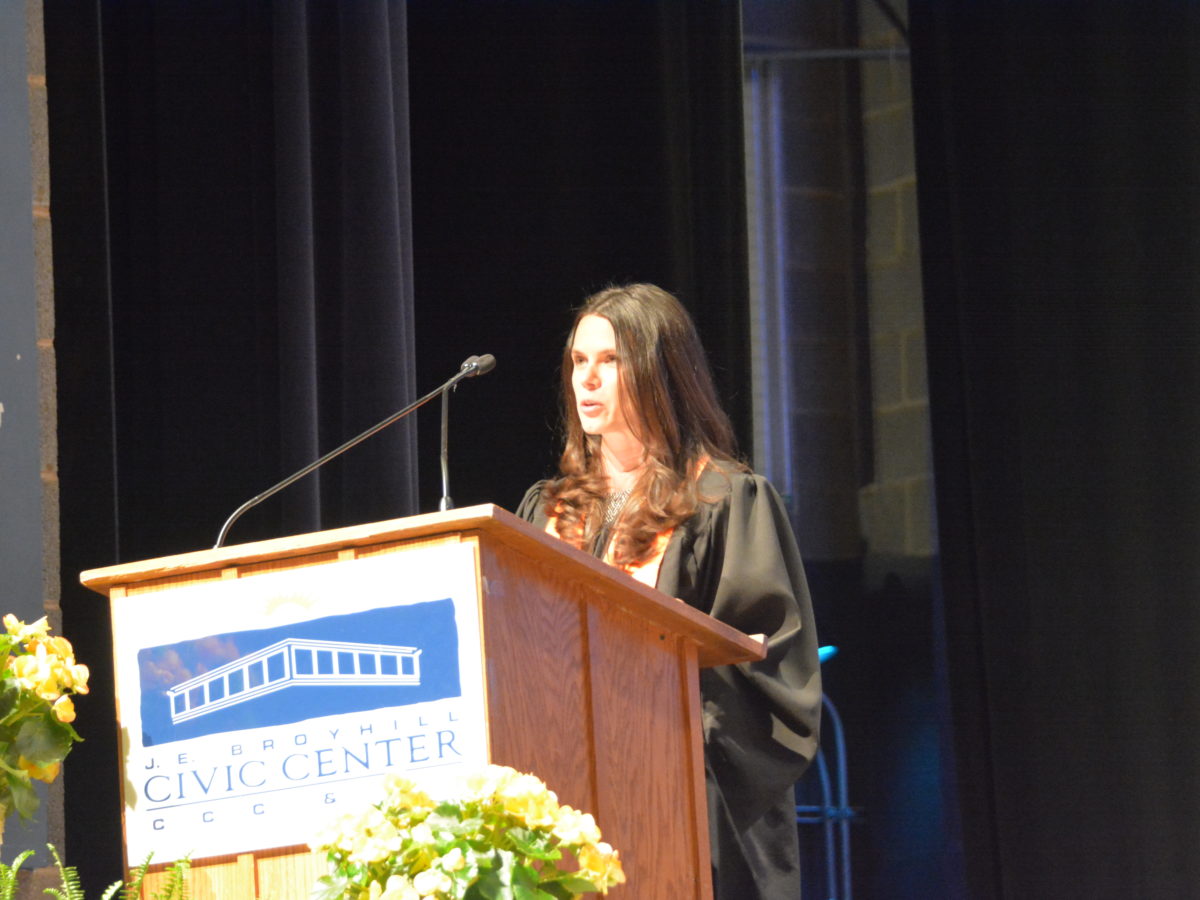
More than 1,000 students were honored Saturday, May 7 at Caldwell Community College & Technical Institute’s (CCC&TI) commencement ceremony — with almost 300 graduates walking the stage.
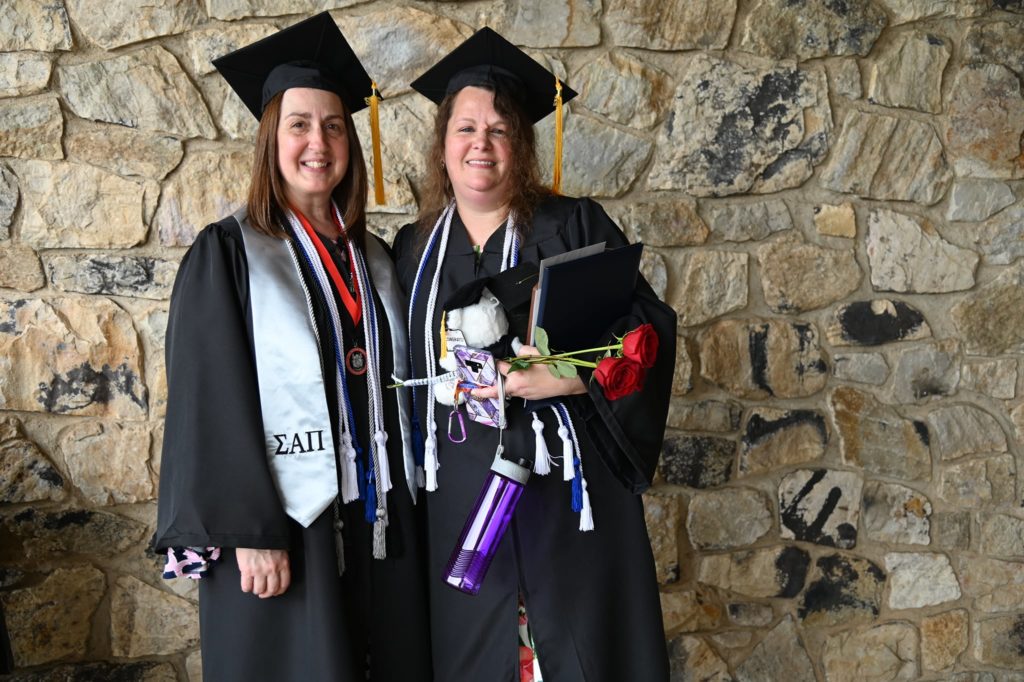
This was a graduation of many firsts. It was the college’s first in-person ceremony since the beginning of the pandemic. Of the 1,016 students honored, 461 were first-generation college graduates and 58 individuals earned their high school credentials.
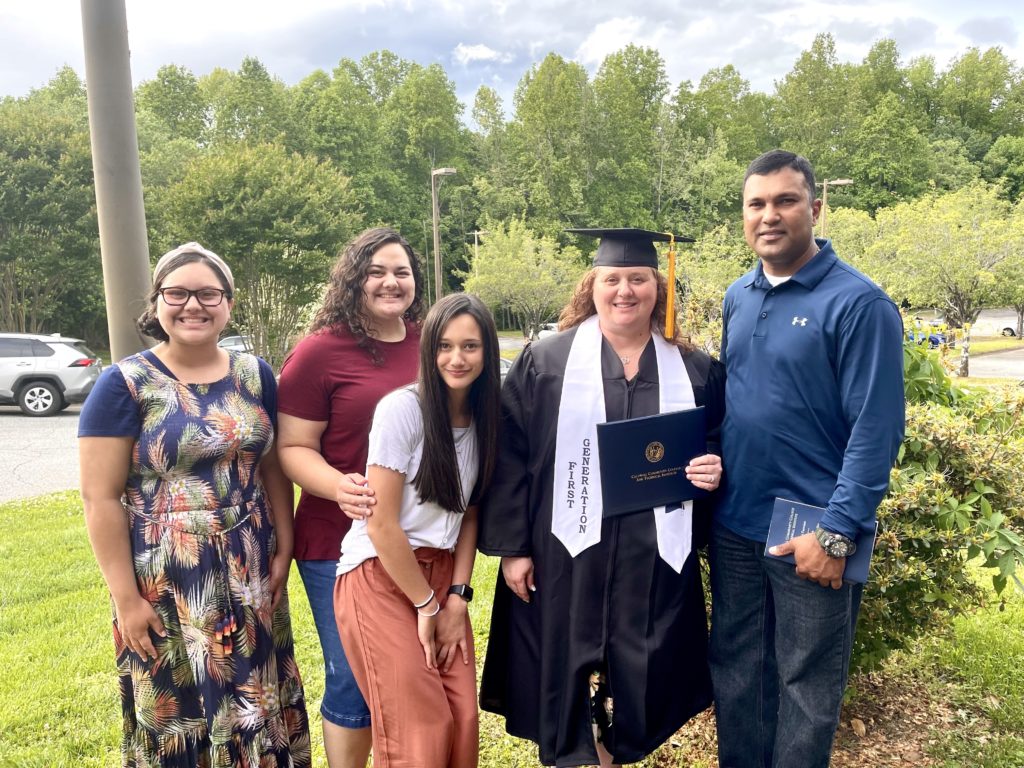
It was also a first for me.
Sixteen years ago I sat on the same stage as the graduates having earned my associate degree from CCC&TI. On Saturday, I returned to the stage, only this time as the college’s commencement speaker.
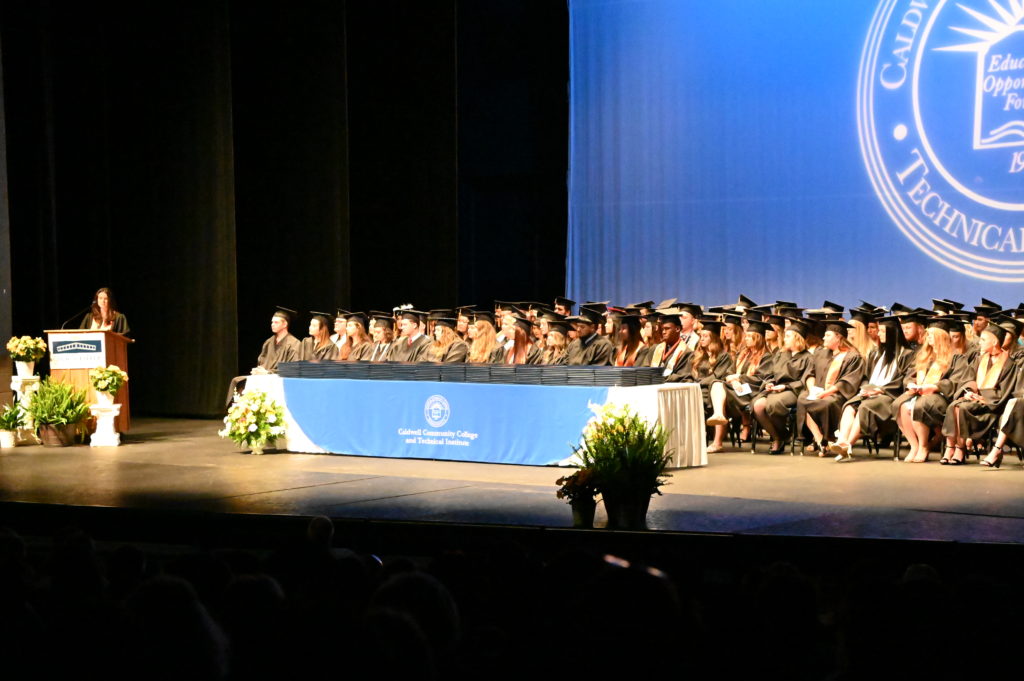
I can’t put into words what it felt like to deliver a speech at the graduation ceremony for the institution that changed the trajectory of my life. What I can share, however, is the contents of the speech which included my own personal story of a North Carolina community college meeting me where I was and providing an education that was transformational.
Saturday, I looked at the faces of CCC&TI graduates and told them to be proud because what they had accomplished was a big deal. I asked them to congratulate themselves for completing an education that, for many, may have seemed out of reach — noting that my own journey included hurdles that almost kept me from being in a graduation seat.

I shared about rural regions — and how I believed one of their strongest assets was a well-rooted and committed community. I talked about the North Carolina Community College System’s annual economic impact of $19.3 billion, how CCC&TI added $169 million in income to their region alone, and as CCC&TI graduates they had already increased their lifetime earning potential.
And then I reminded the graduates that their experiences, story, and voice were important to the fabric of any community and to speak up. I talked about gratitude and how the recent death of a North Carolina community college president was a stark reminder that our time is limited and that we don’t always understand the value of what we have until we no longer have it. I encouraged them to stop long enough to look around — to see the people and the opportunities and to offer help.
Before concluding, I took a moment to address those in the audience who had thought about furthering or completing their education. To them I said:
Don’t let fear hold you back. You belong here too … in a seat for graduates. If you haven’t finished your high school diploma, or you need to learn a new skill, or you want another degree — you can do all that at this institution.
When I turned to face the graduates and tell them how glad I was that they were in one of those seats, I was instantly reminded that everyone on that stage had a story. For some, it was a story of overcoming great adversities or a story of being the first in their family to earn a credential. For others, it was a story of showing up — putting in the effort, eventually making it to the finish line.


Details aside, all of us on that stage Saturday share one thing in common: We are changed people because of the North Carolina Community College System and the people who serve.
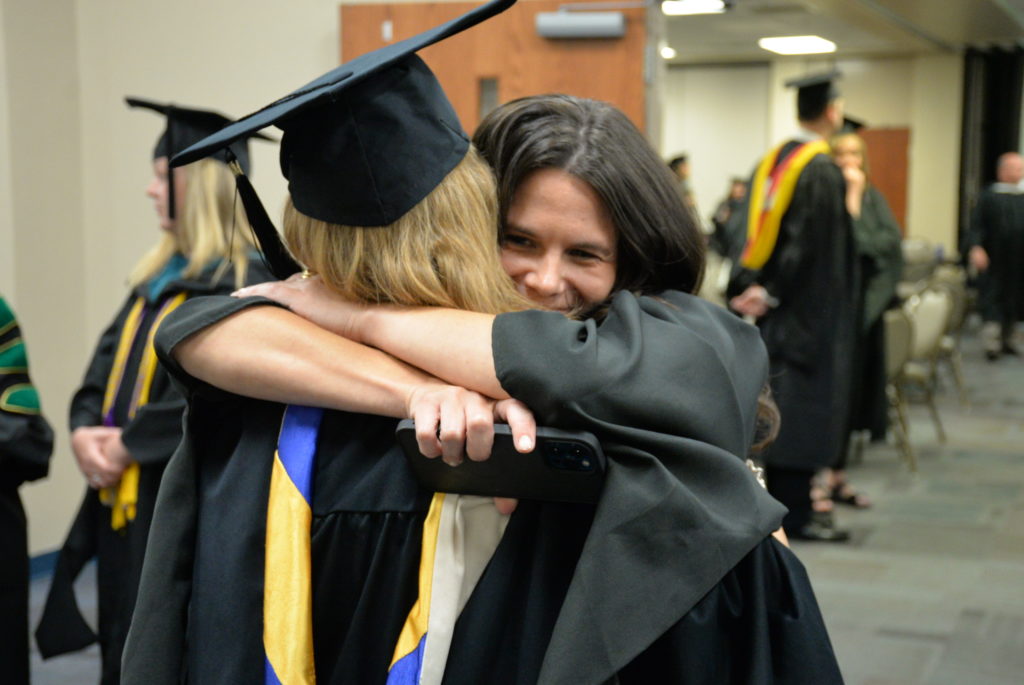
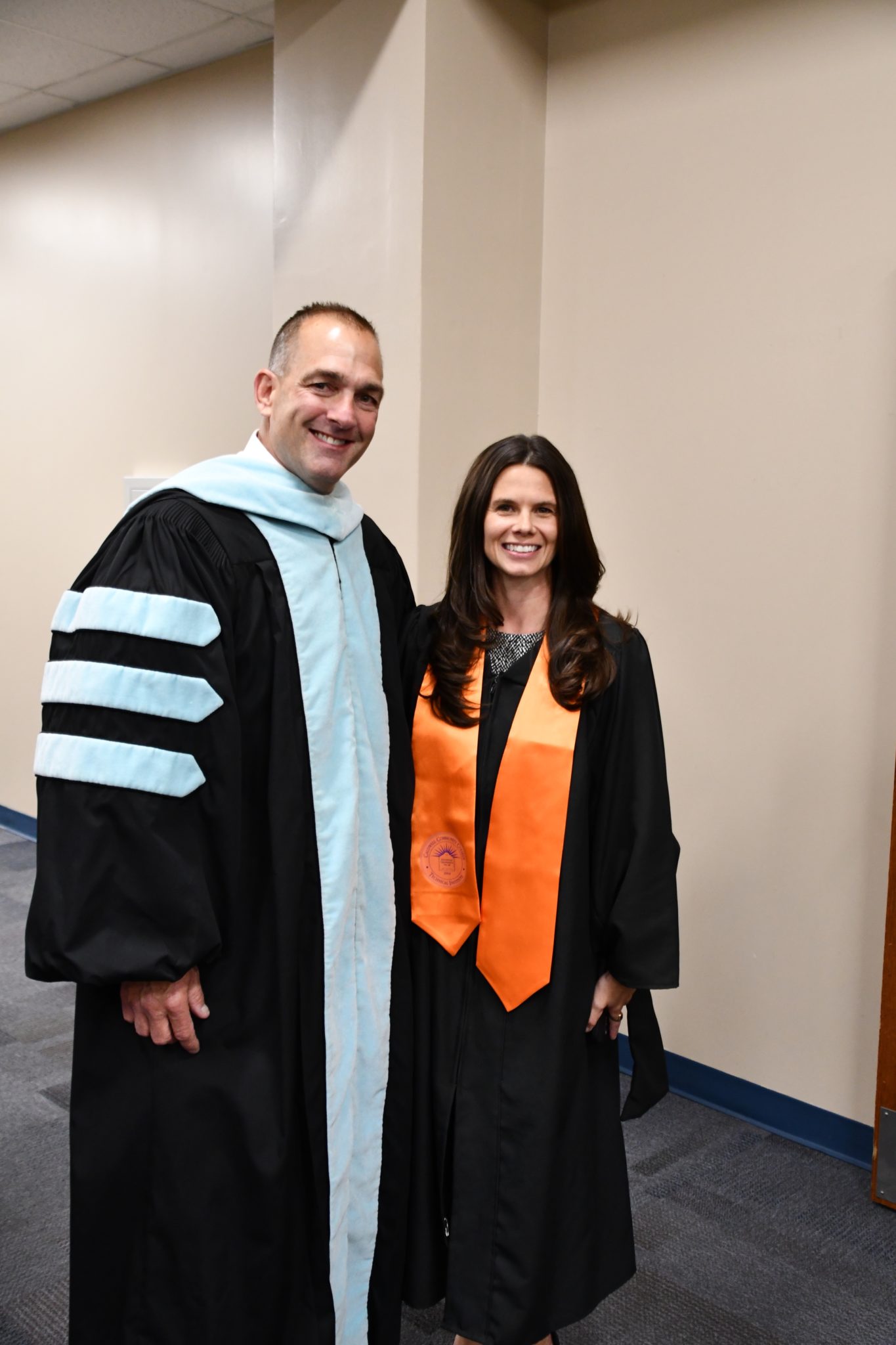
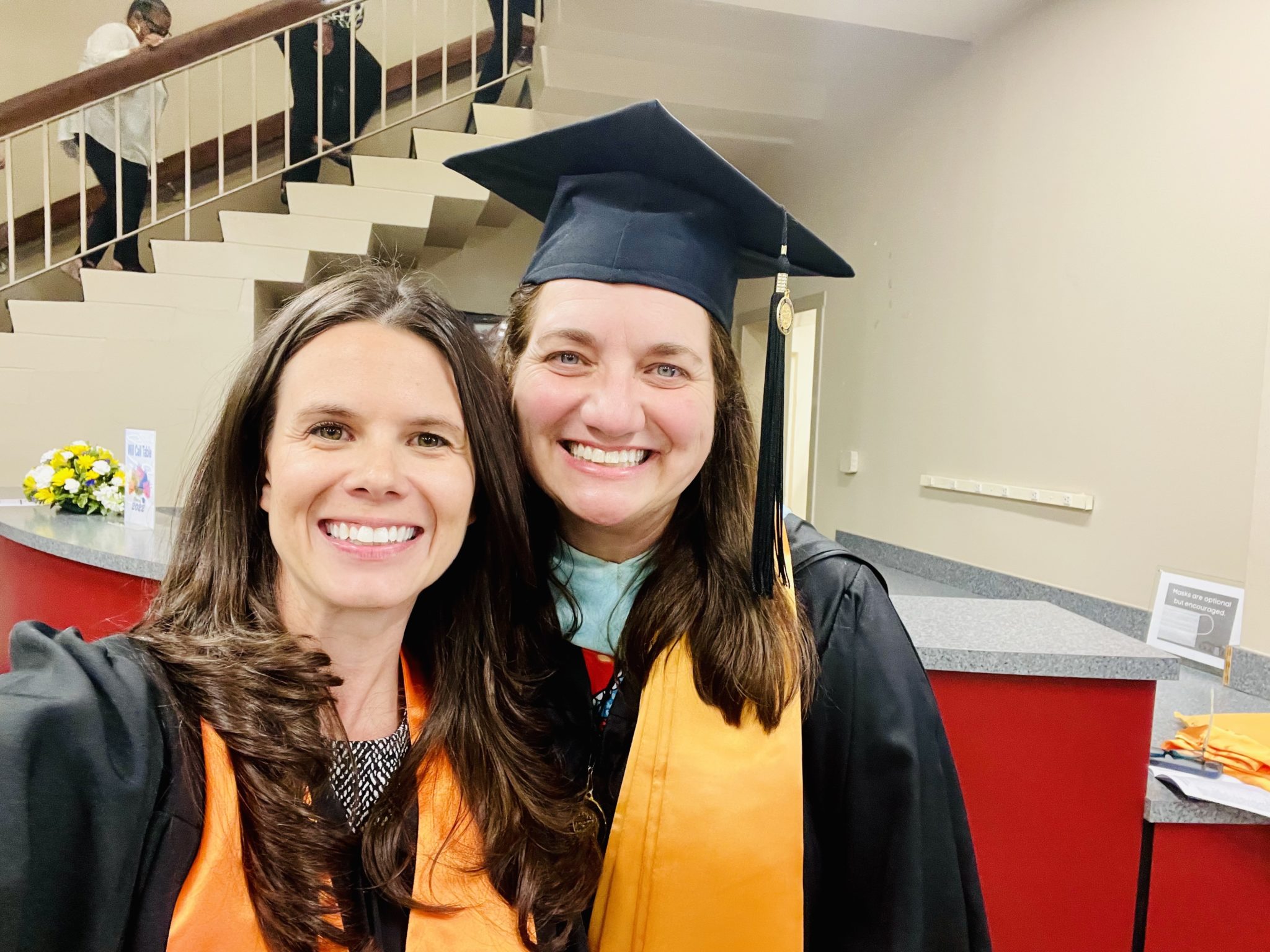
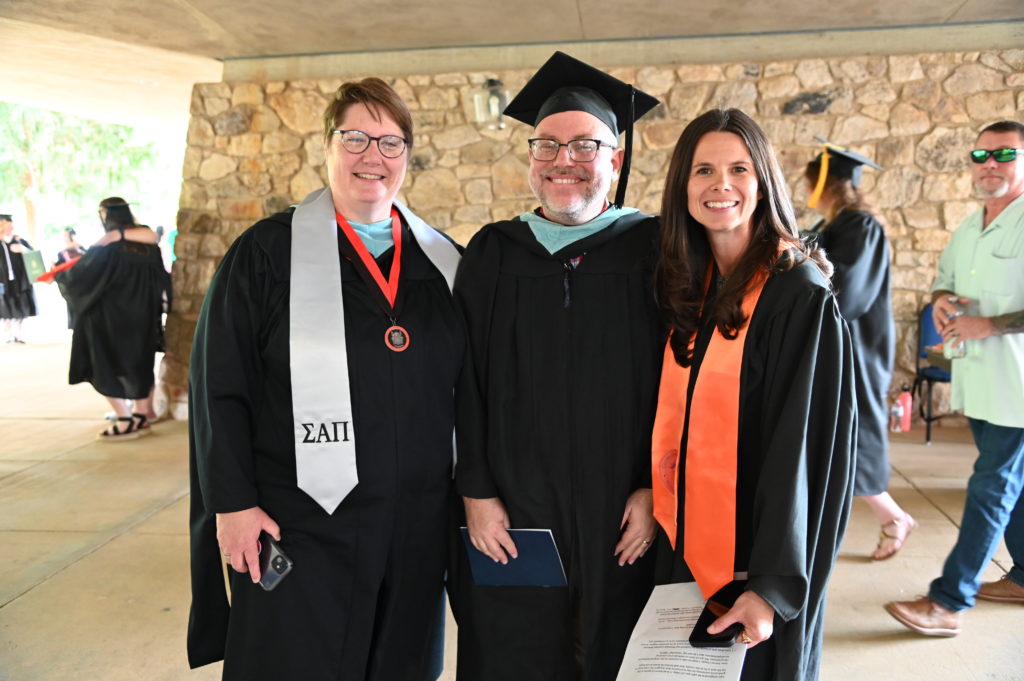
You can read the commencement speech as written or watch the video with my remarks below.
Remarks as written for delivery for the May 7, 2022 commencement for Caldwell Community College & Technical Institute.
I am delighted to be with you all today. It is an honor to speak at the graduation ceremony for the institution that changed the trajectory of my life and to be in the county that will forever be home in my heart.
Now, before I begin, I want to take a moment to say congratulations to the graduates. We are all here to celebrate your amazing accomplishments. And I do not say “amazing” lightly.
Less than 15% of residents in Caldwell and Watauga counties between the ages of 25 and 44 have earned as much as an associate degree. Across the state, less than half of North Carolinians 25 to 44 complete any higher education.
Why am I telling you this?
Because what you have accomplished is a big deal. I want you to remember that and be proud of yourself.
I’m sure you gathered from my initial comments that I am – as Dr. Poarch likes to remind me – a Caldwell County girl. Born and raised.
I am the product of parents and grandparents who worked hard and spent much of their time earning a living in the furniture factories in this region. Their hard work and dedication helped me become who I am today. When I said that Caldwell County will forever be home in my heart, I meant it. There is something about small towns and rural regions that creates in its people a sense of pride. While they may not have all the amenities of a large, urban area, rural regions are made up of residents with deep roots and strong ties who care deeply for the place they call home.
And the people are resilient.
When the main industry in this area started to decline about 20 years ago, most of the people here stayed. Some went back to school, while others searched for different opportunities. And that may just be one of the strongest assets of rural areas – a well-rooted and committed community.
Caldwell Community College is one of 40 of the state’s 58 community colleges that serve at least one rural county. And while the area Caldwell serves is small in comparison to larger institutions, the impact the college has is just as great.
A recent study looked at each of the 58 community colleges in North Carolina to measure their economic impact. The entire system has a $19 billion annual economic impact across the state.
From 2019 to 2020, Caldwell Community College added almost $169 million in income to the region – which supported close to 3,000 jobs.
As CCC&TI graduates, you will go on to earn higher wages, increasing your lifetime earning potential.
I’ll say it again, this institution changes lives. I know, because it changed mine.
Sixteen years ago I was sitting where you are – a graduate. In May 2006, I put on a black robe and shoes I’d never worn before, and tried my best to get that cap to stay on my head. But, I almost wasn’t in one of those seats.
Growing up, I didn’t know anyone in my family who had graduated from college. For most of them, life happened – and furthering their education seemed out of reach.
When I graduated from high school, I felt lost. My gut told me college was a good next step, but I didn’t know the first thing about applying for college or filling out financial aid information. And because I had a bit of a non-traditional high school experience, there was no counselor to offer advice.
And even though I had taken a couple of classes at Caldwell as a dually-enrolled student, going to college full-time seemed much scarier.
With a lot of fear and hesitation, I applied to be a full-time college student. I had not even submitted my application and was already doubting my decision. I also had to fight the notion that because I was choosing to attend a community college that my educational journey was not as significant as that of my peers who were attending a four-year college.
Before I could begin classes, I needed to take a placement test. And, I panicked. I knew I’d probably be okay with English and reading, but math was a different story. I sat frozen in front of a computer screen. I didn’t know most of the math answers. And the results confirmed it. I’d have to take several additional math classes.
And that’s when I almost quit something that I hadn’t even started.
I told myself I was not good enough for college. My math skills were lacking. My educational journey was not going to look anything like my peers. So why even bother?
For reasons I’ll never understand, I did show up that first day of class.
That was hurdle one. Showing up. Hurdle two was finishing my degree.
Every semester for the first year, I found myself filling out a withdrawal form – ready to walk away from college.
And then something would happen. It was almost always an instructor who, at the right moment, gave me the nudge I needed to continue. I don’t think they knew I was close to quitting. But because they were invested in me as a person, it made all the difference.
After two years, I completed my associate degree.
In May 2006, I was in this very building sitting in one of those seats. But it wasn’t until I sat down that I truly realized what I had accomplished. And for the first time, I was proud of myself.
Graduates, I want you to take a moment and reflect on your accomplishments.
Congratulate yourself because you’re the first in your family to earn a credential. Congratulate yourself because you overcame adversities that at one point you thought made going to college out of reach. Congratulate yourself because you are completing an education you started years ago. Or, if you’re like me, maybe you almost weren’t in the very seat you are sitting in now. But you made it.
Regardless of the reason for telling yourself congratulations, you should be proud. You showed up. You put in the effort and now you’re here.
Before I take this seat, allow me to leave you with three pieces of advice – advice I hope you’ll take with you as you embark on your next journey.
Number one: Speak up.
Throughout life, you will find yourself in situations with people who have had different experiences. There may be times when you feel as if your background and experiences are not good enough. Or that you don’t measure up because your life’s path looks different than those around you. But what I’ve come to realize is that there is value in everyone’s journey regardless of the various roads that have been taken. Your experiences, your story, and your voice matter. Speak up.
Number two: Start and end your day with gratitude.
Earlier this year, a North Carolina community college president passed away from cancer. I had the privilege of writing an article about his life and legacy. While researching about him, I found several articles he had published during his time as president.
In one of them, he referenced Joni Mitchell’s song “Big Yellow Taxi.” He used the lyrics, “Don’t it always seem to go that you don’t know what you’ve got ’til it’s gone.”
The president said those lyrics were a reminder that we really don’t understand the value of what we have until we don’t have it anymore. He died soon after that piece was published.
Author Anne Lamott said, “Gratitude is the key to joy. Gratitude or thankfulness is the realization of how much goodness is marbled into our strange and sometimes hard, annoying life.”
The great thing about this habit of gratitude is that you can start at any time. Even now. Make note of those in this room with you who have helped and supported you during your educational journey. Family, friends, faculty, and staff. And, if you are so inclined, you should tell them thank you. I know I plan to do that today.
And number three: Offer help.
Quite often we get so focused on our next steps that we forget to look around. Figuratively, that is. And when you don’t look, you miss things. Like the beauty of the Blue Ridge mountains or the North Carolina coastline. But you also miss the people. And when you don’t see the people, you don’t see the opportunities to help. After all, that is what life is mostly about. Helping those around us.
So who are the people around you that you can encourage to take the next step in their own educational journey? Who can you help navigate this process or offer advice when they just need someone to say, “You’ve got this.”
Now I know this speech is intended for those graduating today – but I do have something to say to those in this room (or online) who have thought about furthering or completing their education.
Don’t let fear hold you back. You belong here too … in a seat for graduates. If you haven’t finished your high school diploma, or you need to learn a new skill, or you want another degree – you can do all that at this institution.
The great thing about the North Carolina Community College System is that it was designed for students to enter college regardless of their educational background. The colleges meet people where they are and provide them with an education that will transform their lives and the lives of their family. Just as today’s graduates have been transformed.
I’ll close with this.
Graduates, I want you to remember that what you have accomplished is a big deal – be proud. I also want you to remember to speak up – your voice matters. Remember to live with gratitude – even when life is hard and annoying. And don’t forget to look around – find the people who you can help.
Congratulations graduates. Thank you for sharing your day with me. I am glad you are in those seats.


